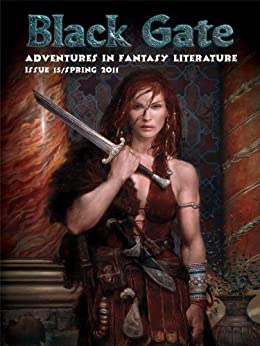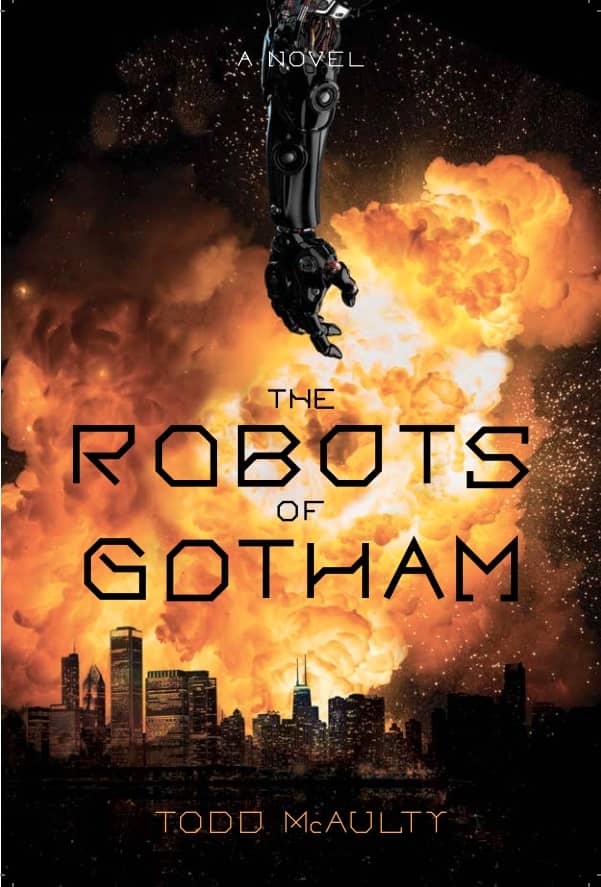No Time Like the Present
“Do you know where you are, Mr. Starr?”
I snapped awake once more, realizing I’d dozed off again. The therapist sat back on her chair, her crisp white jacket and black pencil skirt the picture of professional cool. I moved my eyes left and right, trying to remind myself where, exactly, I was.
The evaluation vault was warm, bright white, and, if the monitor above the therapist’s head was to be believed, well over ninety-nine percent germ free. I blinked and squinted in the brightness, still recovering after my ejection from the the pressure sauna, which had left my skin a bright pink, save for the circles around my eyes from the protective goggles, and, under my white paper medical gown, a similarly protected region provided by the official Black Gate thong I’d been assigned to use while within, which had since been reclaimed.
“Am I in the Black Gate medical wing?” I guessed, trying furiously to remember how I might have gotten there.
“That’s right,” the therapist said, her voice soothing. “Now, I want you to think back. What’s the last thing you remember? Before the incident?”
“I, um, well, I remember being brought to the medical wing because of a… paper cut?” That didn’t seem quite right.
“Yes,” the therapist replied. “A paper cut. With all 384 pages of the print edition of Black Gate #15. Naturally, we couldn’t have you bleeding out on the contents of the archives, so you were brought here. While we managed to save your life – and most of your organs – we were forced to use an experimental rescue technique, and have you clinically frozen until technology was advanced enough to revive you.”
“Wait. Are you saying I’ve been… frozen?”
“That’s right. Welcome back, Mr. Starr! You’ve been gone a long time.”
“Thanks.” I struggled to form coherent words, as my surprise combined with my other forms of disorientation to render me nearly speechless. “What year is this?”
“It’s 2021. A lot has changed.”
“Are there… are there flying cars?” I asked, feeling a surge of hope.
“Not intentionally, no. And you missed the entire McAulty Administration, so that’s unfortunate. But there are upsides to the present.”
“Really? Like what?” This seemed like a rare positive development, and I might have leaned forward expectantly. The therapist put her pen coquettishly to glossy lips and cocked her head, considering which of the many positive developments to reveal first.
“Well,” she offered, “the blog is still up and running stronger than ever!”
Her enthusiasm made me hide my disappointment. “That’s… gee… that’s fantastic.”
“And,” she continued, “since the Writer’s Union was put down just last week, Mr. O’Neill thought it was high time to bring in the reserves. The second- and third-string writers. To fill the holes in the roster. That’s where you come in.”
“Mr. O’Neill asked for me specifically?” I asked, startled, and rather pleased.
She blinked. “Yes. Yes, he did.” She held her pen expectantly. “Now, what might you be blogging about?”
A cloud of doubt descended, and I shifted uncomfortably in my paper gown. “I did have a list of topics I wanted to cover. And a few older pieces I’ve completed in the past. Before the… cryogenics. But blogging is a pretty timely thing, so these older pieces are likely completely out of date and irrelevant. So I guess I’ll have to get started on new material.”
“That’s the spirit!” The therapist gave a round of approving finger-guns, her perfect nails glinting. “And prose? I assume you’re planning on abandoning all of your previous efforts as well? You know, completed short stories, novellas and even entire novels, all consigned to the flame?”
“Consigned to the… that’s a bit extreme, isn’t it? Those novels take a while to write, after all.”
“Mmm. I sure they do. But wouldn’t you feel better if you discontinuing work on these hopelessly aging projects in favor of, shall we say younger work? To let go of the tragically unpublished past, in order to move forward into a bright, potentially also-unpublished future?”
I craned my neck, trying to see her notes. “Is that medical testimony by Fantasy and Science Fiction Magazine?” I asked. She shifted her clipboard with a pout, so I continued. “I’m just saying that publishing a story or a novel is something you can’t give up on. Material that gets rejected in one place can often see publication elsewhere. It’s a matter of accepting rejection, and not letting it crush your enthusiasm for a piece. And sometimes a new and radically different draft can really energize an older story, and make it far better than it was before.”
“I’m pretty sure I remember Sir James Enge advising writers to attack their older output with hammers, but perhaps I’m mistaken. We’ll let that go, shall we?” She flipped a page authoritatively. “So you feel that this older material, as we’ll call it, is still salvageable?”
“Oh, yes,” I replied. “Fiction can have a long shelf life. With a new draft before a send-out, older stories and novels can still be marketable. Even if you suddenly lose seven years, for example.”
“Mm-hmm.” A note was made on the clipboard. “So it’s your contention that being timely isn’t a concern for the modern writer of heroic and adventurous fantasy?”
“I wouldn’t put it that way, exactly,” I said, squirming. “I mean, there’s a lot of so-called Golden Age SF that isn’t really socially-” I dropped off, seeing her slight frown, and the lowering of her long lashes. “What I mean to say is that writers should be careful to not chase after fads, is all. Zombies, and all that. I mean, if a person were to, oh, I don’t know, get suddenly frozen for seven years, and awaken to a strange new world that no longer hungered for zombie apocalypse fiction, they’d have nothing but their love of the story to fall back on.”
“Hmm, yes. And you believe that this is the more important aspect of a piece? This so-called-” here she checked her own notes “love of the story?”
“Yes. Obviously.”
“And I seem to hear you saying that a successful writer might even suppress their desire to write timely, popular fiction in order to service this need within themselves?”
“I, uh, think that’s what I’m saying… Anyway, I think the point is to not abandon good work just because a few years have gone by – say, seven – and it still hasn’t been published.”
“I believe there’s a slush pile somewhere that might disagree,” she singsonged, her eyes narrowing whimsically, both playful and faintly disapproving. She flipped another page, sitting straight once more. “Well, this has been a rare treat, but I’m afraid our time is up! Welcome back, Mr. Starr. Here’s your thermal Mylar blanket, and I’ll just have an orderly wheel you on up to the barracks so you can begin your reeducation.”
“My what?”
“Orientation. You returning employee orientation.”
I sighed in relief. This strange future wasn’t so different from the distant past after all.



Wait until you’re ushered into the oak-panelled sanctum of the dark lord himself – no doubt chewing on his customary cigar and spitting out his usual, acid sarcasms. Seven years isn’t that long, but sometimes a man can hold onto his looks well into early middle age only to have them vanish almost overnight. A few extra pounds. A few less hairs on one’s head. No wonder he’s got meaner!
Wait, are you saying this out loud? I…
I DON’T KNOW WHAT YOUR TALKING ABOUT. uh… CERTAINLY NOT MR. O’NEILL. HE’S um… HE’S A PARAGON OF uh… VIRTUE. VIRTUE AND MANLINESS. YOU MUST um… YOU MUST BE THINKING OF SOME OTHER PERSON. that’s, uh, THAT’S IT, YES. ANOTHER PERSON OTHER THAN MR. O’NEILL, WHO WOULD NEVER SAY A MEAN THING, AND NEVER, EVER LISTEN IN ON TWO PEOPLE IN THE COMMENT BULLPEN. WHICH IS WHY HE’S CERTAINLY. NOT. LISTENING. IN. RIGHT. NOW!